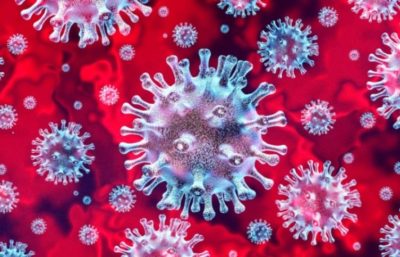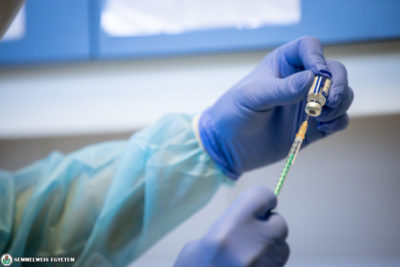Around 1,200 people participated in the free coronavirus antibody level testing at Semmelweis University announced on 15 June, when the university laboratory tested the antibody levels after the administration of all five vaccine types available in Hungary. Roche’s test targeting antibodies against the spike protein RBD responsible for the spread of the SARS-CoV-2 virus, was positive in 88% of cases in those who had had negative result of a previous antibody test. Based on the proportion of positive results, all five two-dose vaccines can effectively induce antibody production.
The efficacy of a vaccine means the percentage by which it can prevent the vaccinated person from becoming ill and having serious complications. However, the result depends not only on the products, but also on several other factors, such as age, chronic underlying disease, the way the vaccine was administered, the time elapsed since the vaccine was given or previous infection.
The WHO considers a vaccine to be effective if it has a proven efficacy of 50-60% in different phases of clinical trials. Based on the data provided by the manufacturers, all the coronavirus vaccines available in Hungary meet this criterion.
In case of COVID-19 caused by the SARS-CoV-2 virus, the following valuse were detected after the second dose in clinical trials of two-dose vaccines:
the Pfizer/BioNTech (Comirnaty) vaccine has an efficacy of 95%, the vaccine of Moderna has an efficacy of 94,5%, the Oxford/AstraZeneca vaccine (using the 12 weeks of vaccination schedule) has 82% efficacy, the Russian vaccine of Gamaleja (Szputnyik V) has 97,6% efficacy and the Chinese Sinopharm’s vaccine has an efficacy of 79,4% on average. On average, the maximum level of immunity may be achieved two to three weeks after the administration of both doses of the vaccines. These data are not yet known for newer coronavirus variants.
Although several health organizations, including the U. S. Food and Drug Administration (FDA) or the Centers for Disease Control and Prevention (CDC) have clearly stated that they do not recommend antibody level testing after coronavirus vaccination and drawing conclusions, yet many people decide to have the test done and the laboratories use the most diverse test types. This process accelerated with the appearance of tests that can be performed at home. However, it is important to note that the sensitivity and accuracy of these tests may be different.
The role of medical science and thus Semmelweis University is not limited to patient care in a pandemic, it also has the responsibility to try to answer the questions related to the spread of the disease, prevention and immunity. The general public is extremely concerned about antibody levels after vaccination and the different sensitivity of the antibody tests may cause a feeling of insecurity, therefore the university considered it important to investigate this issue with a standardized process producing comparable results.
During the study, Semmelweis University took blood samples of 1,195 individuals who previously had a negative antibody test result.
The study showed that 88% of those, who had previously tested negative for coronavirus antibodies were tested positive for coronavirus antibodies in the the university’s antibody testing, which means that these individuals had a detectable and sufficient level of anti-viral antibodies.
The results of the performed tests are summarized below:
|
Vaccine |
Previously tested negative for coronavirus antibodies |
Negative antibody test result at Semmelweis University as well |
Proportion of positive cases (sufficient level of antibodies detected) |
|
Sinopharm |
881 |
143 |
84% |
|
Pfizer |
109 |
3 |
97% |
|
Moderna |
16 |
1 |
94% |
|
AstraZeneca |
69 |
2 |
97% |
|
Sputnik-V |
120 |
0 |
100% |
|
ALTOGETHER |
1195 |
149 |
88% |
However, the opinion of Semmelweis University remains that the efficacy of certain vaccines can only be determined on the basis of the changes in the number of infections, illnesses, hospital admissions and fatality after vaccination. Semmelweis University, as one of the largest COVID care providers in Hungary, has been following cases in its departments since 26 December (the start of the vaccination program in Hungary) and compares data related to the number and type of vaccines administered to.
The results of antibody testing of individuals vaccinated against COVID-19 at Semmelweis University by vaccine type and age:
|
Vaccine |
Age |
Previously tested negative for coronavirus antibodies |
Negative antibody test result at Semmelweis University as well |
Proportion of positive cases (sufficient level of antibodies detected) |
|
Sinopharm |
-60 |
106 |
7 |
93% |
|
60+ |
775 |
136 |
82% |
|
|
altogether |
881 |
143 |
84% |
|
|
Pfizer |
-60 |
69 |
0 |
100% |
|
60+ |
40 |
3 |
93% |
|
|
altogether |
109 |
3 |
97% |
|
|
Moderna |
-60 |
11 |
1 |
91% |
|
60+ |
5 |
0 |
100% |
|
|
altogether |
16 |
1 |
94% |
|
|
AstraZeneca |
-60 |
57 |
2 |
96% |
|
60+ |
12 |
0 |
100% |
|
|
altogether |
69 |
2 |
97% |
|
|
Sputnik-V |
-60 |
78 |
0 |
100% |
|
60+ |
42 |
0 |
100% |
|
|
altogether |
120 |
0 |
100% |
|
|
Altogether |
-60 |
321 |
10 |
97% |
|
60+ |
874 |
139 |
84% |
|
|
altogether |
1195 |
149 |
88% |
It is important to emphasize that these tests were performed by the institution in a selected population with negative antibody levels and 88% of them had an antibody positivity during the study. In the case of the entire vaccinated population, a previous university study showed antibody positivity of over 96% for all vaccine types used in Hungary.
These results confirm the efficacy of the vaccines used in Hungary. However, the study has a message for those who have not been vaccinated yet. These individuals should get vaccinated as soon as possible in order to protect their own health and that of those around them so that they would be protected against the coronavirus and its complications within a few weeks. The most important message is that the vaccines used in Hungary elicit an adequate antibody response and are effective, and vaccination is the most important and most effective tool of disease control.
Vaccination is the most important measure in the fight against the coronavirus, therefore everyone who has not yet registered for vaccination is urged to do so.
Semmelweis University


